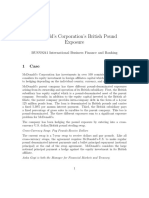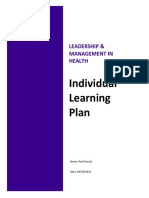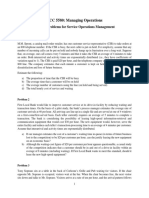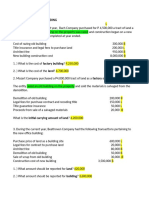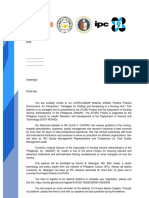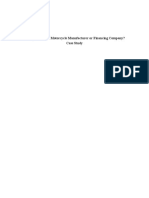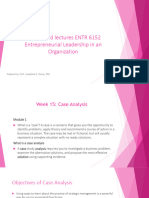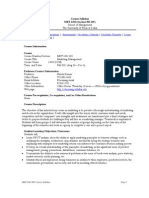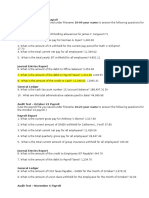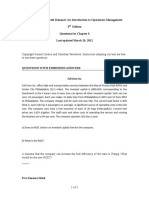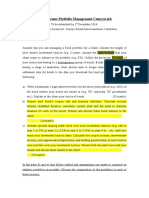Professional Documents
Culture Documents
Module Exercise Questions
Module Exercise Questions
Uploaded by
Joel Christian MascariñaOriginal Description:
Original Title
Copyright
Available Formats
Share this document
Did you find this document useful?
Is this content inappropriate?
Report this DocumentCopyright:
Available Formats
Module Exercise Questions
Module Exercise Questions
Uploaded by
Joel Christian MascariñaCopyright:
Available Formats
Module Exercise Questions
Tips and Tricks for Strong Discussion Posts:
• Your discussion questions should explore the questions "why" and "how"
• Use simple examples, hypothetical situations, attributions, references, and
resources to support your opinions and thoughts
• Avoid relying too heavily on the text. Remember: sources are a support for your
opinions, they do not make them!
• Consider copying/pasting discussion questions before your response to avoid
confusion
• Please do not submit their module exercises using a file attachment
• Post your complete responses to all module questions inside the text box (in one
single post)
• Prepare and save your module exercises in a separate document and then cut
and paste their complete answers in the text box
Module Exercise #1 (Modules 1&2):
1. In your own words, what is disability management? Please refer to the
goals of disability management in your response (e.g., function, early
intervention)
2. From your understanding, what are the main differences between medical
models of disability and social models of disability? What about each of
the models may or may not work in the contemporary Canadian
workplace?
Module Exercise #2 (Modules 3&4):
1. Are there any stakeholders that are more important in the disability
management process than others? Why or Why not? Explain your
reasoning.
2. Discuss 1-2 ways that you think organizational culture affects disability
management, disability duration and return-to-work.
Module Exercise #3 (Modules 5&6):
1. Explain your understanding of duty to accommodate. What role might a
disability manager play in addressing duty to accommodate?
2. In your opinion, and from the perspective of a disability manager, what
are the main benefits and challenges of an EAP/EFAP.
Module Exercise #4 (Modules 7&8):
1. Based on your learning to date, explain the benefits of having a disability
manager involved in a return-to-work plan. Make specific reference to the
role a disability manager may play in confidentiality, duty to accommodate,
and stay-at-work and return-to-work planning.
2. Imagine you are part of a new business with 1000 employees. You are
tasked with determining whether your company should choose internal or
external disability management services and identifying what types of
disability management programs and strategies the new business should
utilize. Identify whether you would recommend an internal or external
disability management program (and explain why) and state one important
program or one important strategy that would you recommend for this new
business? Defend and support your decisions.
Module Exercise #5 (Modules 9 &10):
1. Do you believe that disability managers should be required to abide by a
professional code of ethics? Why/why not? Learners are encouraged to
identify a scenario and use the decision-making guide by MacDonald to
illustrate, support, and clarify your opinion(s).
2. Identify one or more of the main legal principles that a disability manager
should know in their practice and explore how these principles interact
with disability management.
Module Exercise #6 (Modules 11&12):
1. Choose one of the recent debates/emerging discussions in disability
management presented throughout the readings for this module
(e.g. mental health in the workplace, accessibility legislation, the
Psychological Health and Safety standard). Discuss the implications that
these decisions/changes might have on disability management both in the
short-term and long-term; and consider differing stakeholder perspectives.
2. Do you think that disability management practices can/should be applied in
post-secondary education settings, where students would be parallel to
“employees”? Why/Why not?
You might also like
- Alibaba's Bonds Dilemma: Location, Timing, and Pricing AssignmentDocument5 pagesAlibaba's Bonds Dilemma: Location, Timing, and Pricing AssignmentJoel Christian MascariñaNo ratings yet
- Case 1.1 Abstracting Insurance InformationDocument1 pageCase 1.1 Abstracting Insurance InformationJoel Christian Mascariña100% (1)
- MBA Operations Management Assignment - 11-12Document7 pagesMBA Operations Management Assignment - 11-12Shivanthan Balendra43% (7)
- Ndividual Ssignment AnagementDocument5 pagesNdividual Ssignment AnagementJoel Christian MascariñaNo ratings yet
- Mcdonald'S Corporation'S British Pound Exposure: 1 CaseDocument4 pagesMcdonald'S Corporation'S British Pound Exposure: 1 CaseJoel Christian Mascariña100% (1)
- Human Resource Management 1Document7 pagesHuman Resource Management 1Leane Zapanta0% (1)
- 3CO03 Core Behaviours - ASSESSMENT GUIDE - Feb 2021Document12 pages3CO03 Core Behaviours - ASSESSMENT GUIDE - Feb 2021Mayar MohamedNo ratings yet
- Individual Learning Plan: Leadership & Management in HealthDocument22 pagesIndividual Learning Plan: Leadership & Management in HealthPaul Garcia100% (2)
- 10408065Document4 pages10408065Joel Christian MascariñaNo ratings yet
- 82276224Document2 pages82276224Joel Christian MascariñaNo ratings yet
- Question 1: (8 Points)Document4 pagesQuestion 1: (8 Points)Joel Christian MascariñaNo ratings yet
- NCC 5580: Managing Operations: Practice Problems For Service Operations ManagementDocument2 pagesNCC 5580: Managing Operations: Practice Problems For Service Operations ManagementJoel Christian Mascariña0% (1)
- Problems - Land and Building LDocument8 pagesProblems - Land and Building LJoel Christian Mascariña100% (1)
- BA 302 Exam 1 Study GuideDocument3 pagesBA 302 Exam 1 Study GuideannieNo ratings yet
- Solution For Administrative Management Setting People Up For Success 1st Edition by Cassidy PDFDocument10 pagesSolution For Administrative Management Setting People Up For Success 1st Edition by Cassidy PDFCB OrdersNo ratings yet
- Owners Manual: LINK & PDS Trax Shock AbsorberDocument6 pagesOwners Manual: LINK & PDS Trax Shock AbsorberAntónio PedrosaNo ratings yet
- Webinar Invitation LetterDocument2 pagesWebinar Invitation Letterjpanay100% (1)
- Harley Davidson: Motorcycle Manufacturer or Financing Company? Case StudyDocument5 pagesHarley Davidson: Motorcycle Manufacturer or Financing Company? Case StudyHarsh MNo ratings yet
- Book Review Beyond The Last Blue Mountain - A Life of J.R.D. TATADocument2 pagesBook Review Beyond The Last Blue Mountain - A Life of J.R.D. TATAVishal Singh Rajput0% (1)
- Ilp 2023Document18 pagesIlp 2023Abraham OgboleNo ratings yet
- DBA SIA Module BookletDocument12 pagesDBA SIA Module Booklethassan_401651634No ratings yet
- Full Download PDF of Test Bank For Self-Directed Behavior: Self-Modification For Personal Adjustment 10th Edition All ChapterDocument48 pagesFull Download PDF of Test Bank For Self-Directed Behavior: Self-Modification For Personal Adjustment 10th Edition All Chapterkohheirakshu9100% (9)
- 1-Class Activity 1 Brief and Tasks - MBA603 - T2 2022Document7 pages1-Class Activity 1 Brief and Tasks - MBA603 - T2 2022Master ManNo ratings yet
- Mor 463Document8 pagesMor 463socalsurfyNo ratings yet
- Administrative Office Procedure ACCOUNTING Practice ExamDocument2 pagesAdministrative Office Procedure ACCOUNTING Practice ExamGwyneth DalupingNo ratings yet
- What Is The Purpose of An Executive Summary?: Example: The Main Problem Facing Company XYZ Is That Sales AreDocument10 pagesWhat Is The Purpose of An Executive Summary?: Example: The Main Problem Facing Company XYZ Is That Sales ArevincentNo ratings yet
- Get Test Bank For Self-Directed Behavior: Self-Modification For Personal Adjustment 10th Edition Free All ChaptersDocument48 pagesGet Test Bank For Self-Directed Behavior: Self-Modification For Personal Adjustment 10th Edition Free All Chaptersnecatisyzwan100% (4)
- Consumer Behavior 201819Document11 pagesConsumer Behavior 201819Gurdeep DhindsaNo ratings yet
- CARD-MRI Development Institute, Inc. Module For Blended Learning Course Title Course DescriptionDocument44 pagesCARD-MRI Development Institute, Inc. Module For Blended Learning Course Title Course DescriptionCHRISTIAN LIDANNo ratings yet
- Organisation Performance and Culture 5C001 - V1Document71 pagesOrganisation Performance and Culture 5C001 - V1sorlen008No ratings yet
- Organizational BehaviourDocument85 pagesOrganizational BehaviourzackyzzNo ratings yet
- The IMP TaskDocument4 pagesThe IMP Taskgmurali_179568No ratings yet
- ABE Level 6 Business Ethics and Sustainability Examiner Report December 2018Document8 pagesABE Level 6 Business Ethics and Sustainability Examiner Report December 2018Immanuel LashleyNo ratings yet
- Industrial Organisational PsychologyDocument10 pagesIndustrial Organisational PsychologyChengelvoyen RajeshwareeNo ratings yet
- MODULE I: Introduction To Human Resource Management: Unit 1Document14 pagesMODULE I: Introduction To Human Resource Management: Unit 1Oliver Cris Viñas SilvaNo ratings yet
- Ignou MS-01Document2 pagesIgnou MS-01Sachin MishraNo ratings yet
- Clinical Practice 3Document19 pagesClinical Practice 3Ketheesaran LingamNo ratings yet
- DQ VDocument2 pagesDQ VBIKETI BRIAN CHIKAMAINo ratings yet
- 8517 OB BeenishDocument7 pages8517 OB BeenishSulaman SadiqNo ratings yet
- WEEK15-17 ENTR 6152 Entrepreneurial Leadership in An Organization 2 PDFDocument29 pagesWEEK15-17 ENTR 6152 Entrepreneurial Leadership in An Organization 2 PDFMoca ΔNo ratings yet
- UT Dallas Syllabus For mkt6301.001.11f Taught by Nanda Kumar (Nkumar)Document11 pagesUT Dallas Syllabus For mkt6301.001.11f Taught by Nanda Kumar (Nkumar)UT Dallas Provost's Technology GroupNo ratings yet
- IT6683 Exercise 5 Managing Risk and Conflict or Report Outline 17may13Document6 pagesIT6683 Exercise 5 Managing Risk and Conflict or Report Outline 17may13Sandy AluruNo ratings yet
- HRM 531 Syllabus - v6Document10 pagesHRM 531 Syllabus - v6michelina208No ratings yet
- MGT501 Assessment 1 BriefDocument5 pagesMGT501 Assessment 1 BriefYashoda HewageNo ratings yet
- NR446 RUA-Guideines and Rubric-Revised July 14 2015Document10 pagesNR446 RUA-Guideines and Rubric-Revised July 14 2015the4gameNo ratings yet
- Behavioral Interviewing GuidanceDocument18 pagesBehavioral Interviewing GuidanceKa KlasmeytNo ratings yet
- Ethical Leadership GuidanceDocument3 pagesEthical Leadership Guidancekinarofelix12No ratings yet
- Competitive Strategy MP2-FMBA SyllabusDocument5 pagesCompetitive Strategy MP2-FMBA SyllabusAnanKayNo ratings yet
- Q and A Mini Paper Topics - Week 4 - Human Resources in Healthcare ManagementDocument6 pagesQ and A Mini Paper Topics - Week 4 - Human Resources in Healthcare ManagementDa DarenNo ratings yet
- Reflective AnalysisDocument14 pagesReflective AnalysisRiRiNo ratings yet
- Required Output: I. The Business Case Study ReportDocument7 pagesRequired Output: I. The Business Case Study ReportCyril EstandarteNo ratings yet
- Syllabus PDFDocument7 pagesSyllabus PDFJoshua MockNo ratings yet
- D072 Study GuideDocument37 pagesD072 Study GuidebNo ratings yet
- Change Management SyllabusDocument3 pagesChange Management SyllabusGerald OcanNo ratings yet
- MGT523 SPR (A) DL AY21-22 RequirementDocument7 pagesMGT523 SPR (A) DL AY21-22 RequirementAbdullahNo ratings yet
- Wa0025.Document6 pagesWa0025.LaraNo ratings yet
- Learner GuideDocument38 pagesLearner GuideSyed Ahmad HashmiNo ratings yet
- اسئلة المقالي للمراجعةDocument12 pagesاسئلة المقالي للمراجعةOsamh AbdullahNo ratings yet
- ACCA F1 Night Before NotesDocument20 pagesACCA F1 Night Before NotesMarlyn RichardsNo ratings yet
- UT Dallas Syllabus For mkt6301.001.11f Taught by Nanda Kumar (Nkumar)Document12 pagesUT Dallas Syllabus For mkt6301.001.11f Taught by Nanda Kumar (Nkumar)UT Dallas Provost's Technology GroupNo ratings yet
- Specific Course Work AreasDocument7 pagesSpecific Course Work Areasbatesybataj3100% (2)
- MKT306 July 2019 Assessment BriefDocument6 pagesMKT306 July 2019 Assessment BriefHoài Sơn VũNo ratings yet
- Industrial Relations in Canada 3Rd Edition Hebdon Solutions Manual Full Chapter PDFDocument29 pagesIndustrial Relations in Canada 3Rd Edition Hebdon Solutions Manual Full Chapter PDFnhatmaiqfanmk100% (16)
- C18FM W11 1Revision-StudentwithNotes (CD)Document27 pagesC18FM W11 1Revision-StudentwithNotes (CD)CharityChanNo ratings yet
- Strayer University MGT 500 Homework HelpDocument22 pagesStrayer University MGT 500 Homework HelpjustquestionanswerNo ratings yet
- Business Management 499 Strategic Management Winter Semester, 2005Document8 pagesBusiness Management 499 Strategic Management Winter Semester, 2005Ho Lam HeungNo ratings yet
- Abm Bes Part 1 FinalDocument10 pagesAbm Bes Part 1 FinalSEAN DANIEL AGUARESNo ratings yet
- LO2-apply Work ValuesDocument11 pagesLO2-apply Work ValuestesfayegujiNo ratings yet
- (Download PDF) Organizational Behavior 14th Edition Robbins Solutions Manual Full ChapterDocument51 pages(Download PDF) Organizational Behavior 14th Edition Robbins Solutions Manual Full Chapterrahaaazero100% (8)
- Basic - Uc2.wor in A Team EnvironmentDocument11 pagesBasic - Uc2.wor in A Team EnvironmentkrizylNo ratings yet
- Strategic ManagementDocument26 pagesStrategic ManagementJulian DurangoNo ratings yet
- BA500 MarketingDocument32 pagesBA500 Marketingarshdeep1990No ratings yet
- Final Exam: MIS 3885 - Project Management Fall 2019Document6 pagesFinal Exam: MIS 3885 - Project Management Fall 2019Joel Christian MascariñaNo ratings yet
- My Approach As Leader/Mentor/Coach: (Include Word Count at End of Your Paper) : in No Less Than 300 Words, TakingDocument2 pagesMy Approach As Leader/Mentor/Coach: (Include Word Count at End of Your Paper) : in No Less Than 300 Words, TakingJoel Christian MascariñaNo ratings yet
- Chapter 11 - Overview of Hedge FundsDocument7 pagesChapter 11 - Overview of Hedge FundsJoel Christian MascariñaNo ratings yet
- Online Activity Week 5 Case StudyDocument1 pageOnline Activity Week 5 Case StudyJoel Christian MascariñaNo ratings yet
- Chegg India Pvt. Ltd. MNE Test Paper - Accountancy: Answer Any 5 QuestionsDocument7 pagesChegg India Pvt. Ltd. MNE Test Paper - Accountancy: Answer Any 5 QuestionsJoel Christian MascariñaNo ratings yet
- Course Test Started Submitted Status Attempt Score Time Elapsed InstructionsDocument8 pagesCourse Test Started Submitted Status Attempt Score Time Elapsed InstructionsJoel Christian MascariñaNo ratings yet
- Emily A. Moore: Audit Test - October 9 PayrollDocument3 pagesEmily A. Moore: Audit Test - October 9 PayrollJoel Christian MascariñaNo ratings yet
- Financial Reporting Case Fall 2018 Professor Brian Fitzgerald BackgroundDocument3 pagesFinancial Reporting Case Fall 2018 Professor Brian Fitzgerald BackgroundJoel Christian MascariñaNo ratings yet
- Matching Supply With Demand: An Introduction To Operations Management 3 Edition Questions For Chapter 6 Last Updated March 26, 2012Document2 pagesMatching Supply With Demand: An Introduction To Operations Management 3 Edition Questions For Chapter 6 Last Updated March 26, 2012Joel Christian MascariñaNo ratings yet
- 58766579Document1 page58766579Joel Christian MascariñaNo ratings yet
- Dayton Medical Care, Inc. (Day-Med) Patient Appointment SystemDocument4 pagesDayton Medical Care, Inc. (Day-Med) Patient Appointment SystemJoel Christian MascariñaNo ratings yet
- # Solution: 900,000/100,000 9:. 9 16 144Document5 pages# Solution: 900,000/100,000 9:. 9 16 144Joel Christian MascariñaNo ratings yet
- Fixed Income Portfolio Management CourseworkDocument2 pagesFixed Income Portfolio Management CourseworkJoel Christian MascariñaNo ratings yet
- 52170068Document11 pages52170068Joel Christian MascariñaNo ratings yet
- Mid-Term Exam Review REE 6200 FIU Fall 2018: Important Concepts/topicsDocument2 pagesMid-Term Exam Review REE 6200 FIU Fall 2018: Important Concepts/topicsJoel Christian MascariñaNo ratings yet
- FranchisingDocument2 pagesFranchisingJoel Christian MascariñaNo ratings yet
- Evaluating Mutual Fund Investment Information: Source Source Source Criteria Evaluation 1 2 3Document2 pagesEvaluating Mutual Fund Investment Information: Source Source Source Criteria Evaluation 1 2 3Joel Christian MascariñaNo ratings yet
- 84881793Document6 pages84881793Joel Christian MascariñaNo ratings yet
- 33961444Document3 pages33961444Joel Christian MascariñaNo ratings yet
- Chapter 8 Class Discussion Problems: Situation If Consolidated Return Is Filed If Separate Returns Are FiledDocument10 pagesChapter 8 Class Discussion Problems: Situation If Consolidated Return Is Filed If Separate Returns Are FiledJoel Christian MascariñaNo ratings yet
- Development To Recapitulation0:22Document1 pageDevelopment To Recapitulation0:22Joel Christian MascariñaNo ratings yet
- Blueprint For Telerehab GuidelinesDocument4 pagesBlueprint For Telerehab GuidelinesBill WongNo ratings yet
- M.Tech. in Quality Management: Input QualificationDocument2 pagesM.Tech. in Quality Management: Input QualificationAntony MervinNo ratings yet
- 3 DeformationsDocument13 pages3 DeformationsAymen HssainiNo ratings yet
- Spi Al Fara 380 BSP 13SN377 14 January 2020.Document188 pagesSpi Al Fara 380 BSP 13SN377 14 January 2020.Sn AhsanNo ratings yet
- TD Docomo IntegrationDocument3 pagesTD Docomo IntegrationVishal SuryawaniNo ratings yet
- DBMROVI Psipop CowDocument39 pagesDBMROVI Psipop Cowdbmrovi100% (1)
- MBA AgribusinessDocument52 pagesMBA AgribusinessNihal PatilNo ratings yet
- Kushagra DSADocument37 pagesKushagra DSAJaymin SheladiaNo ratings yet
- Law of Variable ProportionDocument16 pagesLaw of Variable Proportionradhkrishan100% (2)
- 1Document3 pages1Shieremell DiazNo ratings yet
- 20 Winter 2014 - FinalDocument21 pages20 Winter 2014 - FinalVanessa HaliliNo ratings yet
- Course Background: Prof. Abhijit Roy Mobile: 09810817716Document3 pagesCourse Background: Prof. Abhijit Roy Mobile: 09810817716Aayush RastogiNo ratings yet
- 1 s2.0 S0304389404001918 MainDocument15 pages1 s2.0 S0304389404001918 MainkuspiluNo ratings yet
- 1mrk509075-Men D en Builder S Guide - CombiflexDocument123 pages1mrk509075-Men D en Builder S Guide - CombiflexCarlos RiveraNo ratings yet
- TCW Part 1 Midterm 2nd - Sem.2021!22!2Document71 pagesTCW Part 1 Midterm 2nd - Sem.2021!22!2John Michael MendezNo ratings yet
- RF Connectors PDFDocument126 pagesRF Connectors PDFMaksy MaksyNo ratings yet
- MiX 4000 Serial Upgrader - Application NoteDocument6 pagesMiX 4000 Serial Upgrader - Application NoteEfreider Alvarado PinillaNo ratings yet
- Republic v. CA and MaxinoDocument4 pagesRepublic v. CA and MaxinoCistron ExonNo ratings yet
- Ebang Ebit E12 Hash Board Repair GuideDocument29 pagesEbang Ebit E12 Hash Board Repair Guideluis pintoNo ratings yet
- Running Head: Chocolate Shortage 1Document6 pagesRunning Head: Chocolate Shortage 1api-259803645No ratings yet
- Bangla Letter WritingDocument32 pagesBangla Letter WritingDeepraj DasNo ratings yet
- M&I 05-GeometricalTolerancing2017 v01Document20 pagesM&I 05-GeometricalTolerancing2017 v01Akash100% (1)
- Research AssDocument3 pagesResearch AssJuhainah C. Guro LptNo ratings yet
- Cómo Escribir Un Ensayo Descriptivo Sobre Una PersonaDocument6 pagesCómo Escribir Un Ensayo Descriptivo Sobre Una Personag696esnz100% (1)
- United States v. Sterlyn Hewlett, 4th Cir. (2014)Document3 pagesUnited States v. Sterlyn Hewlett, 4th Cir. (2014)Scribd Government DocsNo ratings yet
- Bearings: Purpose of Bearings - Loads - Types of Bearings - Materials - Construction - ApplicationDocument15 pagesBearings: Purpose of Bearings - Loads - Types of Bearings - Materials - Construction - ApplicationSeanRiniFernando100% (1)




